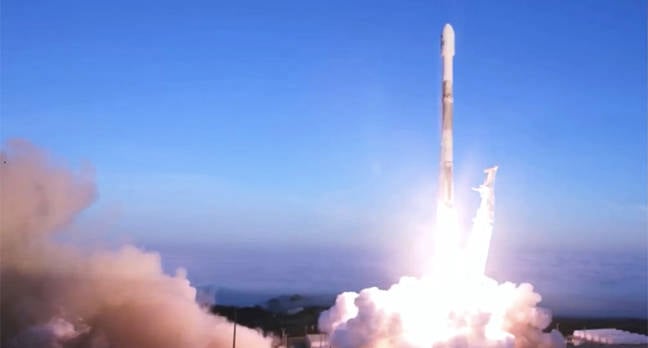FCC Acting Commissioner Proposes Dedicated Spectrum For Private Space Launches

FCC acting commissh Jessica Rosenworcel has proposed giving the US commercial space industry a dedicated block of spectrum in order to support future rocket launches.
The measure would allow a secondary allocation to the 2200-2290-MHZ band to be used by private space travel and satellite companies during the pre-launch testing and launch phases. At present, this wavelength is only available to federal agencies and approved foreign partners [PDF] and is limited to a handful of specific use-cases: tracking, telemetry, and control data communications.
Although private operators can access dedicated spectrum, this is only available on an ad-hoc basis, with independent commercial space firms forced to apply for Special Temporary Authority (STA) in advance.
In a blog post, Rosenworcel said these rule changes would advance "US leadership in a new era of commercial space launches."
"Thanks to powerfully innovative American companies, commercial space launches are becoming more common," she said. "Last year, United States companies sent 39 rockets into orbit, up from only 7 in 2012. Yet despite the revolutionary activity in our atmosphere, the regulatory frameworks we rely on to support these efforts are dated.
"The FCC will vote on a proposal to make much-needed spectrum available for the first time to support the private launch industry. We will also consider a rulemaking to explore how the FCC can continue to support future communications needs of this growing industry."
The FCC's strategy differs slightly from that adopted by Ofcom in the UK. Whereas the US has a dedicated block of spectrum intended for space launches and operations, Blighty's telecoms regulator offers a range of bands in the mid, Ka [PDF], and mmWave ranges, each earmarked for a specific use such as tracking radars, communications links, and site operations.
Although Ofcom believes its existing licensing and authorisation schemes "should cover the spectrum requirements for most of the activities required for space launch," there is some flexibility.
In 2019, Ofcom began consulting with the private space industry to determine their needs, coinciding with the government's stated ambitions to turn the UK into a low-cost space hub by this year, and has welcomed requests from operators for bespoke tranches of bandwidth. ®
From Chip War To Cloud War: The Next Frontier In Global Tech Competition
The global chip war, characterized by intense competition among nations and corporations for supremacy in semiconductor ... Read more
The High Stakes Of Tech Regulation: Security Risks And Market Dynamics
The influence of tech giants in the global economy continues to grow, raising crucial questions about how to balance sec... Read more
The Tyranny Of Instagram Interiors: Why It's Time To Break Free From Algorithm-Driven Aesthetics
Instagram has become a dominant force in shaping interior design trends, offering a seemingly endless stream of inspirat... Read more
The Data Crunch In AI: Strategies For Sustainability
Exploring solutions to the imminent exhaustion of internet data for AI training.As the artificial intelligence (AI) indu... Read more
Google Abandons Four-Year Effort To Remove Cookies From Chrome Browser
After four years of dedicated effort, Google has decided to abandon its plan to remove third-party cookies from its Chro... Read more
LinkedIn Embraces AI And Gamification To Drive User Engagement And Revenue
In an effort to tackle slowing revenue growth and enhance user engagement, LinkedIn is turning to artificial intelligenc... Read more

